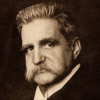Hjalmar Branting

Hjalmar Branting
Karl Hjalmar Branting was a Swedish politician. He was the leader of the Swedish Social Democratic Party, and Prime Minister during three separate periods. When Branting came to power in 1920, he was the first Social Democratic Prime Minister of Sweden. When he took office for a second term after the general election of 1921, he became the first socialist politician in Europe to do so following elections with universal suffrage. In 1921, Sweden's Prime Minister Hjalmar Branting shared the Peace...
NationalitySwedish
ProfessionPolitician
Date of Birth23 November 1860
CityStockholm, Sweden
CountrySweden
I have already mentioned that recent years have brought with them much disillusionment concerning what has so far been achieved by humanity.
The kind of support encouraged by such modes of expression has always arisen basically from confusing the fatherland itself with the social conditions which happened to prevail in it.
Before the war there were many who were more or less ignorant of the international labor movement but who nevertheless turned to it for salvation when the threat of war arose. They hoped that the workers would never permit a war.
We must remember that the people for whom this change represents a first taste of freedom and a new and brighter future did not allow their resolution to falter, no matter how great the suffering by which they bought this independence.
The whole collective force of the League is to be turned against the aggressor, with more or less pressure according to the need.
The League of Nations is not the only organization, albeit the most official, which has inscribed the maintenance of peace through law on its banner.
There is no reason why agreement on particular points should not be both possible and advantageous to the so-called neutrals and to one or more of the blocs, either existing or in the process of formation, within the League of Nations.
At Geneva, the neutral states were often in agreement concerning the preliminaries for Genoa, and Genoa itself was marked by a quite natural mutual exchange of ideas.
I do not overlook the fact that the appearance of these new, free nations in the European political community not only celebrates the return of the prodigal son but also creates new sources of friction here and there
It is a commonplace that the League of Nations is not yet-what its most enthusiastic protagonists intended it to be
The World War broke out with such elemental violence, and with such resort to all means for leading or misleading public opinion, that no time was available for reflection and consideration
Fraternity among nations, however, touches the deepest desire of human nature
As a result of the World War and of a peace whose imperfections and risks are no longer denied by anyone, are we not even further away from the great aspirations and hopes for peace and fraternity than we were one or two decades ago?
But it is possible that, in the days ahead, these years we have lived through may eventually be thought of simply as a period of disturbance and regression